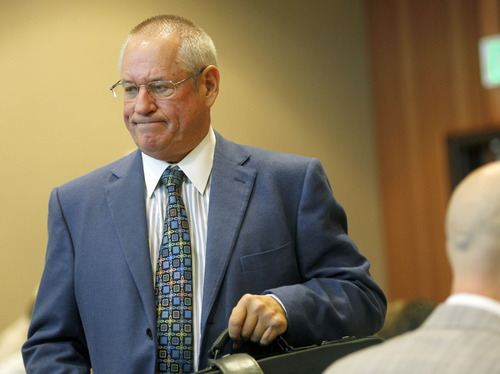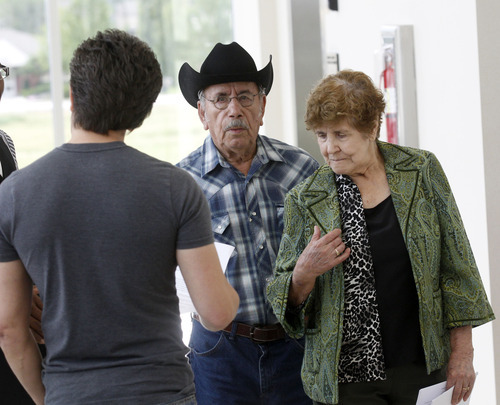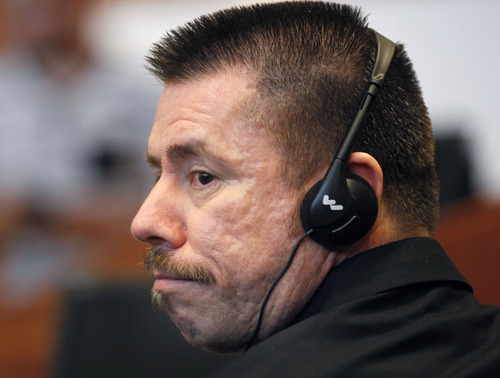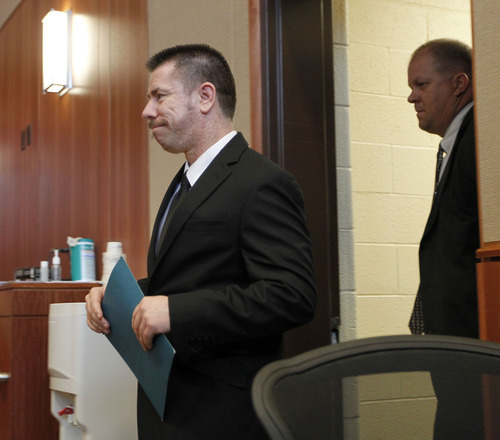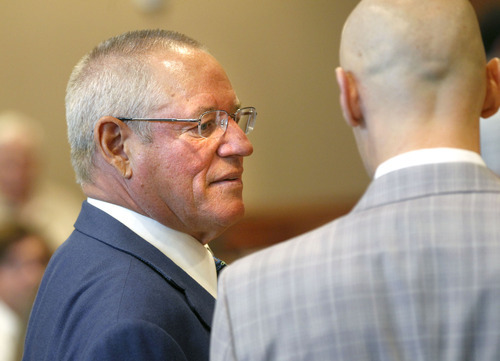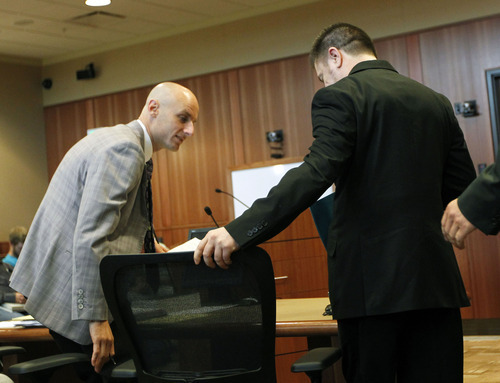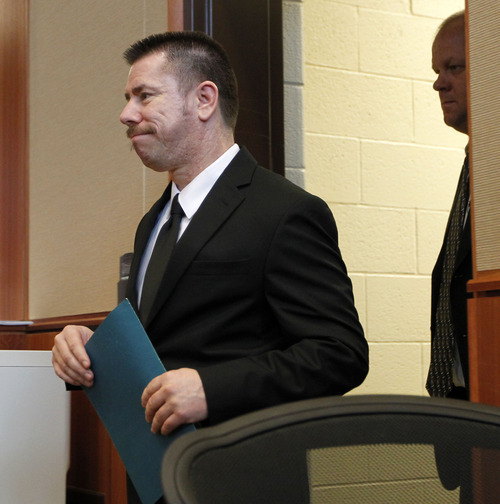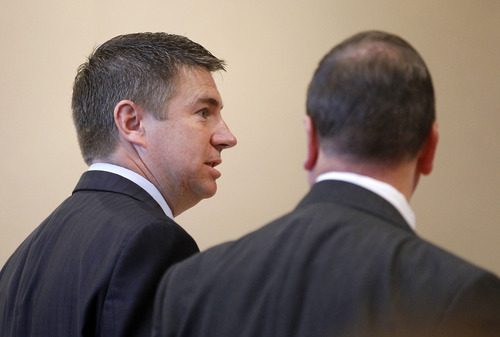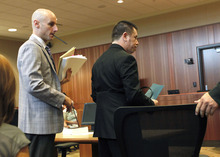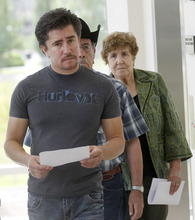This is an archived article that was published on sltrib.com in 2012, and information in the article may be outdated. It is provided only for personal research purposes and may not be reprinted.
Spanish Fork • As the trial for the man accused of shooting and killing a Millard County sheriff's deputy got under way Monday, prosecutors focused on the defendant's own words.
"This defendant told these detectives ... " Deputy Millard County Attorney Patrick Finlinson repeated throughout his opening statements to the jury of six men and four women.
In an interview with Utah County detectives after his arrest in 2010, Roberto Miramontes Roman detailed the morning of Jan. 5 — the shooting death of Deputy Josie Greathouse Fox and Roman's subsequent short-lived escape.
"Most of the evidence in this case comes from what the defendant" told detectives, Finlinson said, adding that Roman's account is supported by physical evidence.
Fox, 37, was Millard County's first and only female patrol deputy.
Roman, "told [detectives] he knew it was a girl cop when she screamed," Finlinson told jurors.
Fox had become a deputy in her 30s.
"Tragically that career, that started late, ended early," Finlinson said.
Dressed in a black suit, with a white shirt and black tie, only a monitor on Roman's right ankle gave the 40-year-old man away as a prisoner.
A few rows behind him in the quiet courtroom, the defendant's mother and father watched and listened to an interpreter as jury selection began.
"We don't believe that he was the one who did it," Roman's younger brother, Mike, said Monday morning.
Mike Roman called his brother a hard worker, who grew up on ranches and farms in Mexico and Millard County.
"He's very kind. Always making people laugh. He's not an angry guy," the brother said.
"He's in OK spirits," the brother added. "He's worried — worried about the trial not being fair."
Defense attorney Stephen McCaughey did not make an opening statement, instead reserving that opportunity for later in the trial, which is scheduled to run through next week.
Román is charged in 4th District Court with first-degree felony aggravated murder and felony counts of evidence tampering and illegal possession of a dangerous weapon.
Prosecutors had intended to seek the death penalty, but Judge Donald Eyre ruled last month that Román's IQ was below 70. That, by legal definition, means Román is mentally retarded and prosecutors cannot seek the death penalty.
With death off the table, prosecutors and defense attorneys needed to select only 10 jurors — two fewer than the dozen otherwise needed.
If convicted of murder, Román faces possible sentences of 20 years to life or life without parole. No longer a death penalty case, the sentence would be decided by a judge, not a jury.
McCaughey has declined to discuss specifics of his defense strategy, other than that Román claims he did not kill Fox. "He says he's innocent," McCaughey said last week.
According to preliminary hearing testimony and court documents, Román and Fox's brother, Ryan Greathouse, met in separate cars, on a dirt road in central Utah, shortly after midnight on Jan. 5, 2010. During the meeting, Greathouse — who was found dead from an overdose in a Las Vegas hotel room just months later — allegedly bought drugs from Román and then the two drove off in separate directions.
The sheriff's office has said it was watching the area after a rash of trailer thefts, and the rendezvous drew suspicion. A Millard County sheriff's sergeant followed Greathouse's car and ordered Fox to follow the 1995 gray Cadillac Deville allegedly driven by Román.
Finlinson recounted Roman's interview with police — how the man told detectives he had taken an AK-47 from the trunk of the car and put it in the cab with him; how the man told Ryan Greathouse "that if he was stopped by a police officer he would shoot them."
When Fox stopped the Cadillac near Delta, just after 1 a.m., Finlinson said Roman was surprised when the officer came up to him on the driver's side. Roman grabbed the AK-47's pistol grip, stuck the barrel out the window and fired.
A bullet pierced Fox's protective vest.
Three casings were later found in Roman's abandoned car. And the bullet fragment from Fox's body matched the gun, which Roman threw from the car as he fled, but later led police to by drawing them a map.
Román had fled north but crashed his car in a snowbank near Nephi. That's when a friend, Ruben Chavez-Reyes, said he picked the man up and drove him to Salt Lake City.
At a May 2011 parole hearing, Chavez-Reyes, who is serving a prison sentence for his role in the escape, said he believed Román had a doctor's appointment in Salt Lake. They drove to the home of Román's relatives. Chavez-Reyes said he spent part of the day playing video games.
Meanwhile, police had tracked Román's cell phone to Salt Lake City. A state trooper spotted an orange Corvette with the license plate that belonged to the Cadillac outside a home near 1100 West and 300 South.
During a door-to-door search of the area, Chavez-Reyes said he gave officers his name and was told to leave the area. At a gas station a few blocks away, Chavez-Reyes said he panicked after Román told him what had actually happened.
They left the car in Salt Lake City, took TRAX to Sandy, a bus to Provo and hired a car for $300 to drive them to Beaver, where they were arrested Jan. 6 sleeping in a tool shed, according to testimony.
Fox and Román grew up not far from each other in Millard County; Fox in Lynndyl and Román miles away in Delta, where his family settled after leaving Mexico more than 30 years ago.
In past interviews, Román's family has said he began milking cows in Millard County's dairy farms at the age of 16.
By age 20, however, court records show Román had turned to drugs.
At first, he was convicted of marijuana possession. Then in August 1996, police found cocaine and a 9mm handgun within reach as he drove a van.
He was sentenced to prison and released in September 1998 to be deported to Mexico. He was caught in 2005 trying to re-enter the U.S. in Arizona.
Shortly after that, his family has said, he returned to Millard County to work at a dairy farm.
In hearings earlier this year, a psychiatrist called Román "the odd man out" in his family, and said early alcohol and drug use may have damaged his brain. Doctors said Román struggled with impulse control and decision making. When he was younger, he would walk in front of trucks "and thought he had superhuman abilities" to make them stop, they said.
Fox, too, had troubles with drugs.
In a 2010 interview with The Salt Lake Tribune, Cindy Greathouse said her daughter skipped classes at Delta High School, experimented with marijuana and methamphetamine before getting pregnant as a teenager.
But out of her own struggles, Fox found new purpose.
In 2005, she set out to become a Millard County sheriff's deputy. She went through Peace Officer Standards and Training, finishing in the same class as Jared Francom, a member of the Weber-Morgan Narcotics Strike Force who was killed in a shootout while serving a search warrant at an Ogden home earlier this year.
Fox is the only female peace officer to die on the job in Utah.
It has been 17 years since a Utah defendant has gone to trial for killing a law officer. That was in 1995, when a jury convicted Jason Scott Pearson of killing Utah Highway Patrol Trooper Dennis Lund during a 1993 chase along Interstate 70.
Twitter: @aaronfalk



